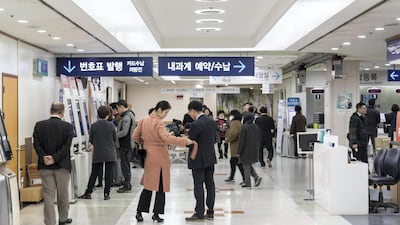Established in 1978, Seoul National University Hospital is South Korea's first and one of its most prestigious hospitals.
Having been at the core of medicine development, the hospital has been leading in medical innovation in the country.
It has a cutting-edge network of facilities, opening Korea's first paediatric hospital in 1985 to discover new treatment of children's diseases. It also specialises in cancer medicine, cardiovascular diseases, transplants and it is the country's only hospital specialising in adult and geriatric diseases.
In 2013, it was ranked first in the world in clinical trials registered with the US National Institute of Health database. A year later, it opened and managed the 248-bed Sheikh Khalifa Speciality Hospital in Ras Al Khaimah – a contract it won in the face of competition from world-renowned institutions such as John Hopkins in Baltimore, Stanford in California and King's College Hospital in London.
"We're focused on high-tech and rare diseases that other medical institutions cannot treat," said Dr Chang-suk Suh, the hospital's president. "I'm very much confident that the UAE gets its partners in the right way and the RAK Speciality Hospital is evolving more. It's expanding and we hope to get the second stage contract from next year, then we can get more [sophisticated work] like liver transplantation and more advanced cases."
_______________
Read more:
Emirati tells of 'outstanding' medical treatment following transplant in South Korea
Korean president: 'I look forward to taking our strategic partnership to new heights'
Korea and UAE will be century-long partners, says ambassador
_______________
The hospital is now focusing on educating key personnel working at UAE hospitals. “If all goes well with the second stage, we would like to train cardiologists and intensive care doctors, like respiratory doctors and neurologists,” he said.
“You have a lot of demand from the UAE for cardiovascular and transplantation – training takes at least two or three years and we want to extend that into the main cities of the Emirates.”

